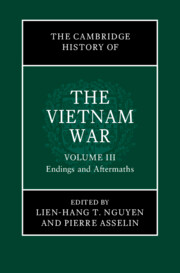Book contents
- The Cambridge History of the Vietnam War
- The Cambridge History of the Vietnam War
- The Cambridge History of the Vietnam War
- Copyright page
- Contents
- Figures
- Maps
- Contributors to Volume III
- General Introduction
- Introduction
- Part I The Late Vietnam War
- 1 Nixon’s War
- 2 US Military Strategy in the Nixon Era
- 3 The US Congress and the Vietnam War
- 4 US Antiwar Sentiment and International Relationships in the Late Vietnam War
- 5 Saigon War Politics, 1968–1975
- 6 Hanoi’s Politburo at War, 1969–1975
- 7 The Vietnam War and the Regional Context
- 8 Moscow, Beijing, and Détente
- 9 The Easter Offensive and the Second Air War
- 10 The Second Civil War, 1973–1975
- 11 Cambodia at War
- 12 Laos at War
- Part II The Postwar Era
- Part III Legacies
- Index
5 - Saigon War Politics, 1968–1975
from Part I - The Late Vietnam War
Published online by Cambridge University Press: 02 January 2025
- The Cambridge History of the Vietnam War
- The Cambridge History of the Vietnam War
- The Cambridge History of the Vietnam War
- Copyright page
- Contents
- Figures
- Maps
- Contributors to Volume III
- General Introduction
- Introduction
- Part I The Late Vietnam War
- 1 Nixon’s War
- 2 US Military Strategy in the Nixon Era
- 3 The US Congress and the Vietnam War
- 4 US Antiwar Sentiment and International Relationships in the Late Vietnam War
- 5 Saigon War Politics, 1968–1975
- 6 Hanoi’s Politburo at War, 1969–1975
- 7 The Vietnam War and the Regional Context
- 8 Moscow, Beijing, and Détente
- 9 The Easter Offensive and the Second Air War
- 10 The Second Civil War, 1973–1975
- 11 Cambodia at War
- 12 Laos at War
- Part II The Postwar Era
- Part III Legacies
- Index
Summary
Politics in South Vietnam (aka the Republic of Vietnam) have long been overlooked in most English-language accounts of the Vietnam War, especially during the final years of the conflict. But the breakdown of the Saigon government’s legitimacy in the eyes of its own anti-Communist constituents during this period was decisive in determining the outcome of the war. This chapter explores the wave of anti-Communist solidarity that swept through South Vietnam’s cities and provincial towns following the 1968 Communist Tet Offensive. It analyzes the South Vietnamese state’s ambitious efforts to implement economic, agricultural, and political reforms. And it demonstrates that President Nguyễn Văn Thiệu’s bid to monopolize political power, following clashes with South Vietnam’s civilian parties and institutions, dealt a fatal blow to the establishment of legitimate anti-Communist government in the South. Thiệu’s autocratic turn betrayed the constitutional order on which the state’s authority was based, deflating post-Tet enthusiasm, accelerating American funding cuts, and precipitating South Vietnam’s collapse from within during the final Communist offensive in 1975. Drawing on newly available Vietnamese-language sources, the chapter examines the underappreciated impact of a diverse range of Vietnamese protagonists, who shaped the decisive political breakdown that brought the Vietnam War to its conclusion.
Keywords
- Type
- Chapter
- Information
- The Cambridge History of the Vietnam War , pp. 117 - 140Publisher: Cambridge University PressPrint publication year: 2024

